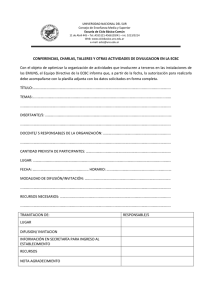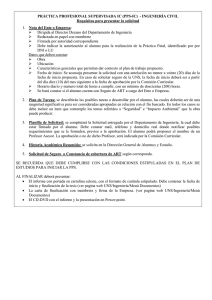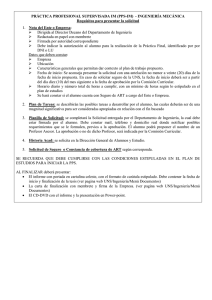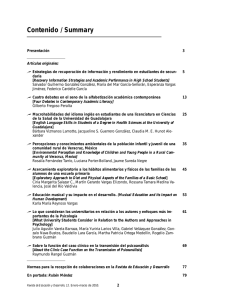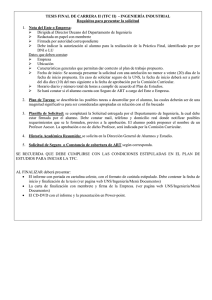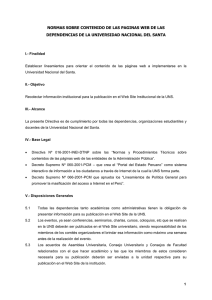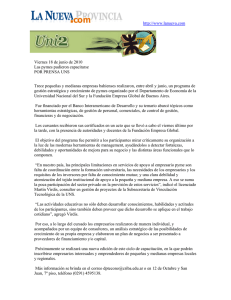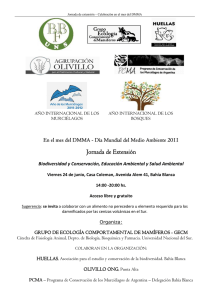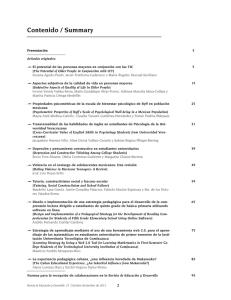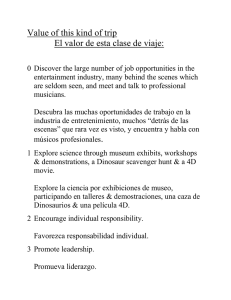Información específica para estudiantes internacionales Specific
Anuncio
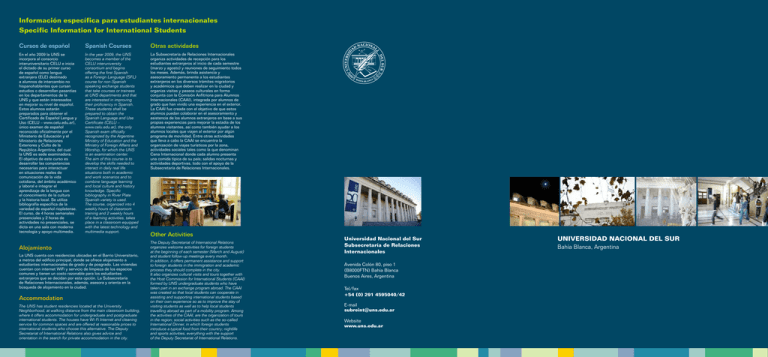
Información específica para estudiantes internacionales Specific Information for International Students Cursos de español Spanish Courses Otras actividades En el año 2009 la UNS se incorpora al consorcio interuniversitario CELU e inicia el dictado de su primer curso de español como lengua extranjera (ELE) destinado a alumnos de intercambio no hispanohablantes que cursan estudios o desarrollan pasantías en los departamentos de la UNS y que están interesados en mejorar su nivel de español. Estos alumnos estarán preparados para obtener el Certificado de Español Lengua y Uso (CELU – www.celu.edu.ar), único examen de español reconocido oficialmente por el Ministerio de Educación y el Ministerio de Relaciones Exteriores y Culto de la República Argentina, del cual la UNS es sede examinadora. El objetivo de este curso es desarrollar las competencias necesarias para interactuar en situaciones reales de comunicación de la vida cotidiana, del ámbito académico y laboral e integrar el aprendizaje de la lengua con el conocimiento de la cultura y la historia local. Se utiliza bibliografía específica de la variedad de español rioplatense. El curso, de 4 horas semanales presenciales y 2 horas de actividades no presenciales, se dicta en una sala con moderna tecnología y apoyo multimedia. In the year 2009, the UNS becomes a member of the CELU interuniversity consortium and begins offering the first Spanish as a Foreign Language (SFL) course for non-Spanish speaking exchange students that take courses or trainees at UNS departments and that are interested in improving their proficiency in Spanish. These students shall be prepared to obtain the Spanish Language and Use Certificate (CELU – www.celu.edu.ar), the only Spanish exam officially recognized by the Argentine Ministry of Education and the Ministry of Foreign Affairs and Worship, for which the UNS is an examination center. The aim of this course is to develop the skills needed to interact in daily real life situations both in academic and work scenarios and to combine language learning and local culture and history knowledge. Specific bibliography in River Plate Spanish variety is used. The course, organized into 4 weekly hours of classroom training and 2 weekly hours of e-learning activities, takes place in a classroom equipped with the latest technology and multimedia support. La Subsecretaría de Relaciones Internacionales organiza actividades de recepción para los estudiantes extranjeros al inicio de cada semestre (marzo y agosto) y reuniones de seguimiento todos los meses. Además, brinda asistencia y asesoramiento permanente a los estudiantes extranjeros en los diversos trámites migratorios y académicos que deben realizar en la ciudad y organiza visitas y paseos culturales en forma conjunta con la Comisión Anfitriona para Alumnos Internacionales (CAAI), integrada por alumnos de grado que han vivido una experiencia en el exterior. La CAAI fue creada con el objetivo de que estos alumnos puedan colaborar en el asesoramiento y asistencia de los alumnos extranjeros en base a sus propias experiencias para mejorar la estadía de los alumnos visitantes, así como también ayudar a los alumnos locales que viajen al exterior por algún programa de movilidad. Entre otras actividades que lleva a cabo la CAAI se encuentra la organización de viajes turísticos por la zona, actividades sociales tales como la que denominan Cena Internacional donde cada alumno presenta una comida típica de su país; salidas nocturnas y actividades deportivas, todo con el apoyo de la Subsecretaría de Relaciones Internacionales. Alojamiento La UNS cuenta con residencias ubicadas en el Barrio Universitario, a metros del edificio principal, donde se ofrece alojamiento a estudiantes internacionales de grado y de posgrado. Las viviendas cuentan con internet WiFi y servicio de limpieza de los espacios comunes y tienen un costo razonable para los estudiantes extranjeros que se decidan por esta opción. La Subsecretaría de Relaciones Internacionales, además, asesora y orienta en la búsqueda de alojamiento en la ciudad. Accommodation The UNS has student residencies located at the University Neighborhood, at walking distance from the main classroom building, where it offers accommodation for undergraduate and postgraduate international students. The houses have Wi-Fi Internet and cleaning service for common spaces and are offered at reasonable prices to international students who choose this alternative. The Deputy Secretariat of International Relations also gives advice and orientation in the search for private accommodation in the city. Other Activities The Deputy Secretariat of International Relations organizes welcome activities for foreign students at the beginning of each semester (March and August) and student follow-up meetings every month. In addition, it offers permanent assistance and support to foreign students in the immigration and academic process they should complete in the city. It also organizes cultural visits and tours together with the Host Commission for International Students (CAAI) formed by UNS undergraduate students who have taken part in an exchange program abroad. The CAAI was created so that local students can cooperate in assisting and supporting international students based on their own experience so as to improve the stay of visiting students as well as to help local students travelling abroad as part of a mobility program. Among the activities of the CAAI, are the organization of tours in the region; social activities such as the so-called International Dinner, in which foreign students introduce a typical food from their country; nightlife and sports activities, everything with the support of the Deputy Secretariat of International Relations. Universidad Nacional del Sur Subsecretaría de Relaciones Internacionales Avenida Colón 80, piso 1 (B8000FTN) Bahía Blanca Buenos Aires, Argentina Tel/fax +54 (0) 291 4595040/42 E-mail subreint@uns.edu.ar Website www.uns.edu.ar UNIVERSIDAD NACIONAL DEL SUR Bahía Blanca, Argentina PERU BRASIL BOLIVIA PA R AG UAY CHILE Iguazú ARGENTINA U R U G UAY Buenos Aires Bahía Blanca Bariloche Puerto Madryn Ushuaia Ubicación geográfica Geographical Location La ciudad de Bahía Blanca está ubicada en el sudoeste de la Provincia de Buenos Aires, República Argentina, sobre la costa del Océano Atlántico. Es una ciudad portuaria e industrial que cuenta con una población de 300.000 habitantes. En la jerarquía de ciudades, por su tamaño, Bahía Blanca es de tipo mediano. El clima es templado y seco con temperaturas moderadas y alta variabilidad. En torno a la Plaza Rivadavia, centro de recreación más antiguo e importante de la ciudad, se desarrolla la principal actividad comercial, bancaria, institucional y hotelera conformando el denominado "microcentro bahiense". Entre los espacios verdes de la ciudad pueden destacarse: el Parque de Mayo, el Parque Independencia, el Paseo de las Esculturas, el Paseo de la Mujer y la Plaza Rivadavia. Bahía Blanca city is located in the Southeast of Buenos Aires Province, Argentine Republic, on the Atlantic coast. It is an industrial city with an important deepwater port and a total population of 300,000 inhabitants, thus being a middle-size city. The weather is dry and temperate with moderate temperatures and high variability. Surrounding Plaza Rivadavia- the oldest and most important recreational center in the city- major business, banking, institutional and hotel activities take place, creating the so-called "microcentro bahiense". Green recreational areas in the city include: Parque de Mayo, Parque Independencia, Paseo de las Esculturas, Paseo de la Mujer and Plaza Rivadavia. Departamentos académicos Academic Departments Las distintas carreras de grado y posgrado que se dictan en la Universidad Nacional del Sur se encuentran agrupadas, de acuerdo a su afinidad, en departamentos académicos: The different undergraduate and postgraduate careers at Universidad Nacional del Sur are grouped into academic departments, according to their affinity: AGRONOMIA Sedes de la UNS / UNS Facilities AGRONOMICS BIOLOGÍA, BIOQUÍMICA Y FARMACIA BIOLOGY, BIOCHEMISTRY AND PHARMACY CIENCIAS DE LA ADMINISTRACIÓN ADMINISTRATION SCIENCES CIENCIAS DE LA SALUD HEALTH SCIENCES CIENCIAS E INGENIERÍA DE LA COMPUTACIÓN COMPUTER SCIENCES AND ENGINEERING DERECHO LAW ECONOMÍA ECONOMICS FÍSICA PHYSICS GEOGRAFÍA Y TURISMO GEOGRAPHY AND TOURISM GEOLOGÍA GEOLOGY HUMANIDADES HUMANITIES INGENIERÍA ENGINEERING 2. COMPLEJO ALEM / 2. ALEM BUILDING 3. COMPLEJO ALTOS DE PALIHUE / 3. ALTOS DE PALIHUE BUILDING 4 3 INGENIERÍA ELÉCTRICA Y DE COMPUTADORAS ELECTRICAL AND COMPUTER ENGINEERING INGENIERÍA QUÍMICA CHEMICAL ENGINEERING MATEMÁTICA MATHEMATICS QUÍMICA CHEMISTRY BAHIA BL ANCA 2 1 La UNS en números The UNS in Numbers 25.000 ESTUDIANTES 25,000 STUDENTS 1. COMPLEJO COLON, SEDE DEL RECTORADO 1. COLON BUILDING, PRESIDENT'S HEADQUARTERS N 4. CCT (CONICET) CENTRO CIENTIFICO Y TECNOLOGICO 4. CCT (CONICET) SCIENTIFIC AND TECHNOLOGICAL CENTER 2.500 DOCENTES 2,500 TEACHING STAFF MEMBERS Perfil institucional Institutional Profile La Universidad Nacional del Sur (UNS) está ubicada a 700 km al sur de la ciudad de Buenos Aires. Es la universidad pública más antigua en la región patagónica, creada el 5 de enero de 1956. Su lema, Ardua Veritatem, significa “la verdad se consigue con esfuerzo”. En los últimos años la UNS ha iniciado un proceso de internacionalización que implica la formulación y puesta en práctica de una política de apertura hacia el exterior. A fin de lograr este objetivo se llevan a cabo diversas actividades tendientes a promover la movilidad de estudiantes, profesores, investigadores y administrativos, la participación en redes de carácter regional e internacional, la oferta educativa de posgrados, la suscripción de convenios con instituciones extranjeras, las investigaciones conjuntas con grupos de otros países, la oferta de un programa de enseñanza de idioma inglés para sus alumnos regulares, la creación de un programa de español como lengua extranjera y la internacionalización de los planes de estudio de las distintas carreras. The Universidad Nacional del Sur (UNS) is located 700 km to the South of Buenos Aires city. It is the oldest public university in the Patagonia region, founded in January 5, 1956. Its motto in Latin, Ardua Veritatem, means “the Truth is found with effort”. In the last few years, the UNS has begun an internationalization process that implies the development and implementation of a policy of openness to the world. In order to achieve this goal, the UNS is developing several activities to promote the mobility of students, teaching staff, researchers, and administrative staff; the participation in regional and international networks; the development of academic postgraduate programs; the subscription of agreements with foreign institutions; the implementation of joint research projects with groups in other countries; the creation of an English as a Foreign Language program for local students and of a Spanish as a Foreign Language program for exchange students; and the internationalization of the curricula of the different careers. Posgrados Postgraduate Programs La oferta de carreras de posgrado incluye 19 doctorados, 23 maestrías y 5 especializaciones, con una duración aproximada de 4 años para los doctorados, 2 años y 6 meses para las maestrías y 2 años para las especializaciones. La mayoría de los posgrados tienen una fuerte orientación hacia las ciencias y la tecnología. Del total de carreras de posgrado acreditadas por la Comisión Nacional de Evaluación y Acreditación Universitaria (CONEAU), 11 fueron categorizadas como Excelentes (A), 12 como Muy buenas (B) y 8 como Buenas (C). Postgraduate programs at the UNS include 19 doctor's degrees, 23 master's degrees and 5 specializations, with an approximate duration of 4 years for doctor's degrees, 2 years and 6 months for master's degrees, and 2 years for specializations. Most postgraduate programs are strongly related to science and technology. Out of the total of postgraduate programs credited by the National Commission for University Assessment and Accreditation (CONEAU), 11 were categorized as Excellent (A), 12 as Very good (B), and 8 as Good (C). Investigación en la UNS La investigación científica en la Universidad Nacional del Sur posee una sólida vinculación con la problemática regional y sus protagonistas son usualmente reconocidos por instituciones académicas, políticas y sociales del país. Además, numerosos docentes e investigadores son miembros de asociaciones de relevancia internacional, y se desempeñan como profesores y conferencistas invitados en otras universidades de la Argentina y del extranjero. Research at the UNS Scientific research at the Universidad Nacional del Sur is strongly linked to regional issues and leading actors are usually recognized by academic, political and social institutions throughout the country. In addition, several professors and researchers are members of internationally relevant associations and work as visiting professors and lecturers at other universities, both in Argentina and abroad. 16 DEPARTAMENTOS ACADÉMICOS 16 ACADEMIC DEPARTMENTS 52 CARRERAS DE GRADO 52 FIRST DEGREE CAREERS 47 CARRERAS DE POSGRADO 47 POSTGRADUATE PROGRAMS 4 COMPLEJOS EDILICIOS PRINCIPALES 4 MAJOR FACILITIES 80.000 M2 DE SUPERFICIE TOTAL 80,000 M2 TOTAL AREA Institutos de investigación científica Scientific Research Institutes Gran parte de los docentes desarrollan sus tareas de investigación en institutos adscriptos por convenio con el Consejo Nacional de Investigaciones Científicas y Técnicas (CONICET), el mayor organismo de promoción e investigación científica del país. Actualmente, son 9 los centros de investigación de doble dependencia (UNSCONICET): el Centro de Recursos Renovables de la Zona Semiárida (CERZOS); el Instituto Argentino de Oceanografía (IADO); el Instituto de Investigaciones Bioquímicas de Bahía Blanca (INIBIBB); la Planta Piloto de Ingeniería Química (PLAPIQUI); el Instituto de Matemática de Bahía Blanca (INMABB); el Instituto de Investigaciones en Ingeniería Eléctrica (IIIE); el Instituto Geológico del Sur (INGEOSUR); el Instituto de Química del Sur (INQUISUR) y el Instituto de Economía (IE). Los cuatro primeros tienen su sede en un complejo denominado Centro Científico y Tecnológico (CCT). En los Departamentos académicos funcionan también diversos institutos, como el Instituto de Investigaciones en Química Orgánica (INIQO), el Instituto de Mecánica Aplicada (IMA), el Instituto de Ingeniería Electroquímica y Corrosión (INIEC), el Instituto de Ciencias e Ingeniería de la Computación y el Instituto de Física, entre otros. Many UNS professors carry out their research work at the institutes esablished by agreement with the National Board for Scientific and Technical Research (CONICET), the largest national body for promotion and scientific research in the country. At present, there are 9 dual structure (UNS-CONICET) research centers: the Center for Renewable Resources in the Semi-Arid Region (CERZOS); the Argentine Oceanographic Institute (IADO); the Bahía Blanca Biochemical Research Institute (INIBIBB); the Chemical Engineering Pilot Plant (PLAPIQUI); the Bahía Blanca Mathematics Institute (INMABB); the Electrical Engineering Research Institute (IIIE); the Southern Geological Institute (INGEOSUR); the Southern Chemical Institute (INQUISUR); and the Institute of Economics (IE). The first four are located at a complex called Scientific and Technological Center (CCT). There are also several research institutes at the academic Departments, such as the Research Institute in Organic Chemistry (INIQO), the Institute of Applied Mechanics (IMA), the Institute of Electrochemical Engineering and Corrosion (INIEC), the Institute of Computer Sciences and Engineering and the Institute of Physics, among others.
